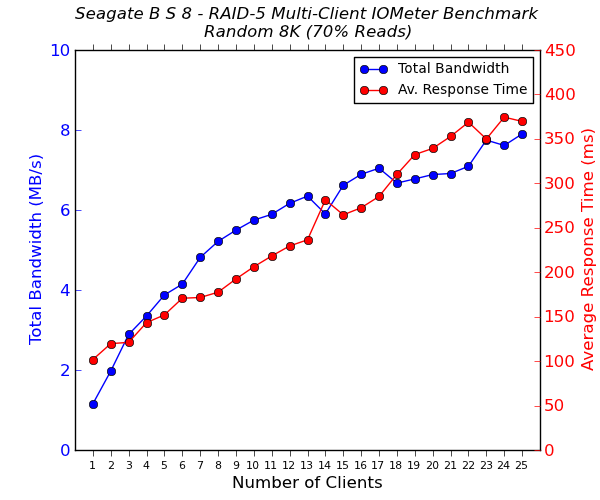Seagate Business Storage 8-Bay 32TB Rackmount NAS Review
by Ganesh T S on March 14, 2014 6:00 AM EST- Posted in
- NAS
- IT Computing
- Seagate
- Enterprise
Multi-Client Performance - CIFS
We put the Seagate Business Storage 8-Bay Rackmount through some IOMeter tests with a CIFS share being accessed from up to 25 VMs simultaneously. The following four graphs show the total available bandwidth and the average response time while being subject to different types of workloads through IOMeter. IOMeter also reports various other metrics of interest such as maximum response time, read and write IOPS, separate read and write bandwidth figures etc. Other interesting aspects from our IOMeter benchmarking run can be found here. Some of the numbers exhibit caching effects.




For comparison, we have the multi-client benchmarking results from our evaluation of the Synology DS1812+ also. The testing conditions are similar (8x 4TB 7200rpm HDDs in RAID-5, 2x 1GbE ports in 802.3ad link aggregation). It is under these conditions that the weakness of the Atom CPU in the DS1812+ gets exposed. We find that the Seagate STDP32000100 is able to provide faster response times as well as more throughput when a large number of clients try to access the NAS simultaneously.










28 Comments
View All Comments
buffhr - Friday, March 14, 2014 - link
I can see the merit in a single point of contact, however at 5.1kusd it is overpriced IMO. Sure the disk = roughly50% of the cost but still 2.5k disk-less for a system that does not support SSH and practically has no ecosystem or encryption...Samus - Friday, March 14, 2014 - link
I can't believe what a hit encryption has on read performance. 25MB/s opposed to 102MB/sec? Holy...extide - Friday, March 14, 2014 - link
It would be a lot better if they used a CPU with AES-NImax1001 - Friday, March 14, 2014 - link
Look at the CPU. There's your answer.Ammohunt - Thursday, March 20, 2014 - link
I agree $5k buys alot of jbod that you can hang off an exiting server and configure however you want ZFS, tgtd, SMB, CIFS, NFS etc..Haravikk - Friday, March 21, 2014 - link
For such a large investment I'm pretty surprised by the lack of attention to detail here. There is no hardware support for encryption, which is crazy; my ~$250 Synology DS212j has an ARM processor with hardware encryption, so why doesn't a $5000+ machine? Also, 2x gigabit ethernet seems pretty meagre these days when any serious data users will be (or should be) investing in 10 gigabit ethernet at the very least, and while the controllers are pricey it would fit well within the huge premium here.I mean, I'm nearly finished building a DIY storage box; it's not racked (since I'm building it around a tower case), but it has 15 hot-swappable 3.5" hard drive bays. I'm using it for direct attached storage and it's coming in around $800 or so, but I don't think a small form factor motherboard sufficient to run ReadyNAS would push me much higher after swapping out the DAS parts. I dunno, for $5000+ I would think an enterprise oriented product should be able to do a lot better than what I can build myself! Even if I switched everything for enterprise parts I'd still come in under.
tech6 - Friday, March 14, 2014 - link
It seems to have become the norm that companies release products with half finished software and expect their customers to be their beta testers. Why would any business in their right mind pay $5K for an unfinished product when there are much better alternatives available?Sadrak85 - Friday, March 14, 2014 - link
Did a back-of-the-envelope calculation a while back; the 2.5" ones just make more sense if you need maximum storage at the moment. That said, when we have the next gen of HDDs filled with helium and holding 10+ TB apiece, 3.5" all the way.Sadrak85 - Friday, March 14, 2014 - link
I eat my words, the 2.5" ones are 9U for 50 drives...which is fewer TB/U, if you can accept the units. This one can make sense after all.Samus - Friday, March 14, 2014 - link
I've replaced all our Seagate Constelation.2 drives over the past 3 years with Hitachi's, as they have failed like clockwork in our HP ML380 that came equipped with them.When I get the replacement back from HP, I put a Hitachi in the cage, install it in the server, and put the Constelation on eBay where I usually get $50. That's all they're worth, apparently.
I love Seagate, but between their load/unload cycle-happy desktop drives that have a pre-determined death, and their ridiculously poor quality SAS drives, I just hope their SSD's are their saving grace, because my how the mighty have fallen from the 7200.7 days.